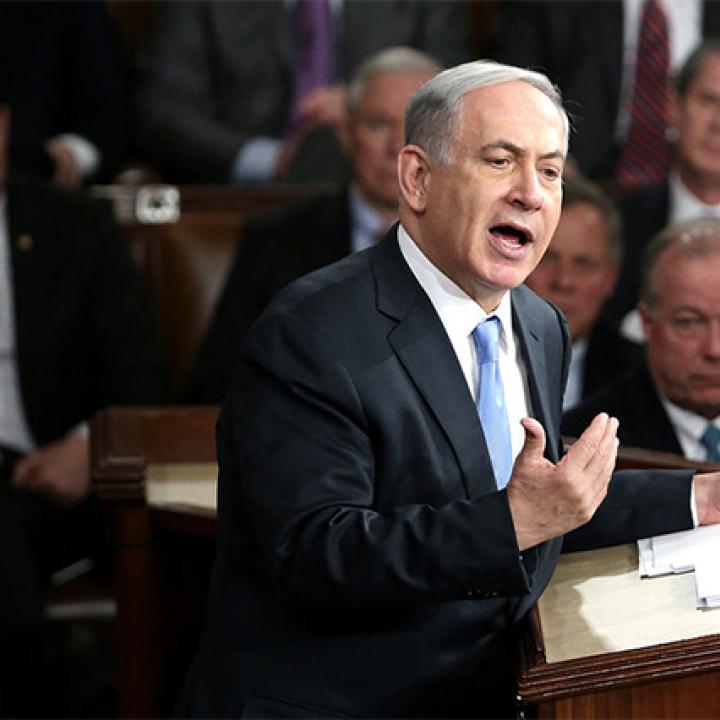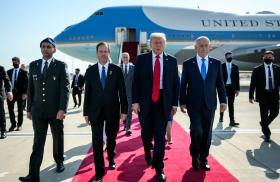
- Policy Analysis
- Policy Forum
The Netanyahu Visit, U.S.-Israel Ties, and the War on Hamas

Three veteran diplomats discuss the context and policy content of the prime minister’s visit amid tumult at home and in Washington.
On July 23, The Washington Institute held a virtual Policy Forum with Morgan Viña, Stuart Eizenstat, and Dennis Ross. Viña formerly served as chief of staff for international security affairs at the Pentagon and vice president of government affairs at JINSA. Eizenstat held senior positions at the White House and the Treasury, State, and Commerce Departments during forty-plus years of public service. Ross, the Institute’s William Davidson Distinguished Fellow, formerly served as special assistant to President Obama and U.S. point man on Israeli-Palestinian negotiations. The following is a rapporteur’s summary of their remarks.
Morgan Viña
To say that Prime Minister Netanyahu’s visit comes at a dynamic time in U.S. politics is an understatement. He will need to remind Congress and the American public why the Middle East and Israel matter to the United States. Observers are not expecting a repeat of his 2015 speech; this time, he likely aims to inspire bilateral unity against common threats such as terrorism and nuclear war.
In particular, it would be smart for him to remind Congress that the United States is under constant threat of Iranian terrorism. Tehran demonstrated this threat as recently as last week when its proxies attacked U.S. forces in Iraq after about three months of relative quiet. In his meetings with House Speaker Mike Johnson and other members of Congress, Netanyahu should emphasize the continued need for U.S. information sharing, intelligence, arms, and munitions as key ingredients for an Israeli victory in this multifront war.
It is also important to mention that Israel’s security has benefited greatly from the Abraham Accords. Under the Biden administration, there has been a major push to bring Saudi Arabia into the fold, with Crown Prince Muhammad bin Salman asking for security guarantees in exchange. Speaking favorably to senators about a treaty with Saudi Arabia could boost Netanyahu’s chances of furthering this process.
Another option he may pursue during the visit is calling for a narrow mutual defense pact between the United States and Israel. This has been repeatedly discussed on the Hill in the past (e.g., by Sen. Lindsey Graham), but no progress has been made since it was first mentioned during the Trump administration. Ultimately, Netanyahu’s goal will be to emphasize that the October 7 attack fundamentally reshaped the Middle East. Israel must reestablish its deterrence, and it cannot do so without resolute U.S. support.
Stuart Eizenstat
In the midst of an intense presidential election, it is difficult to think of a more politically fraught time for Israel’s prime minister to address a joint session of Congress. For many decades after its founding, Israel was a uniting political issue on the right and left of the American political spectrum. Unfortunately, it has now become one of the most divisive foreign policy issues. U.S. attitudes have dramatically diverged along partisan and age lines, with many younger Democrats expressing unfavorable views of Israel. This divide has been widened by the Gaza war and the advent of the most conservative government in Israeli history. It remains to be seen what unifying message of hope Netanyahu can deliver to heal these partisan divisions.
The prime minister might also use his time in the United States to speak about how to achieve a postwar governance and security structure in Gaza. Although Hamas must be disabled as a military and governing organization, Israel has so far failed to heed many of the lessons that America learned through its long wars, including the value of accurate intelligence, achievable military objectives, early postwar political plans, and cooperation with civilian noncombatants.
Real security for Israel will come from placing Gaza into a broader regional context—one in which Israel is embedded in a U.S.-led coalition of moderate Sunni Arab states that can cooperate on military, intelligence, and economic matters toward the wider goal of countering Iran and its proxies. After the war, the Israeli public will have to make a very tough choice: attempt to fix Gaza and face Iran alone, or create a timetable and horizon for an eventual Palestinian state, a prerequisite for normalizing relations with Saudi Arabia and enlisting moderate Arab states to form a coalition. Israel must not isolate itself. It has a chance to join a coalition that would transform its security through the twenty-first century and beyond. Achieving this will not be possible without addressing the Palestinian desire for statehood, but it should not lose this historic opportunity to integrate itself into the region.
Dennis Ross
Initially, Netanyahu saw his speech to Congress as a major opportunity to explain Israel’s experience of October 7 and its aftermath. Most Israelis—from left to right—are still mentally stuck on October 7 even as the rest of the world has moved on. Netanyahu’s speech will reflect this dynamic. Yet the American political context has evolved drastically since Biden announced his withdrawal from the race, so Netanyahu will find it harder to capture the public’s attention with his speech.
One thing is clear: he will approach this speech differently from the one he delivered in 2015, which drew harsh criticism from many Democrats. Despite various bilateral disagreements, the United States has actively supported Israel during the war in political, psychological, and military terms. Netanyahu will therefore go out of his way to thank the president. He will also likely reemphasize that Israel is an American interest, not a Republican or Democratic interest. Toward that end, he will note the two countries’ shared values—though this will be more difficult than usual given that his government currently includes far-right ministers such as Itamar Ben-Gvir and Bezalel Smotrich.
Of course, Netanyahu will still have his own agenda for the speech—namely, reshaping the narrative about October 7 and the war in Gaza. This means reminding listeners who Hamas is by highlighting the group’s brutal kidnapping and killing of civilians. He will also point out that no country in the world would accept having a neighbor like Hamas next door. And he will highlight Israel’s military success against the group.
Netanyahu will also presumably talk about a hostage deal, which the Biden administration has advanced in the hope of gradually ending the war. On this issue, the prime minister is facing simultaneous pressures from the hostage families, the Israel Defense Forces, and his own coalition, including segments of his Likud Party. Still, with the Knesset in recess until November and Biden now able to focus on policy issues rather than reelection, there may be a moment to advance both a hostage deal and Israeli-Saudi normalization in the near term.
This summary was prepared by David Ederberg.





